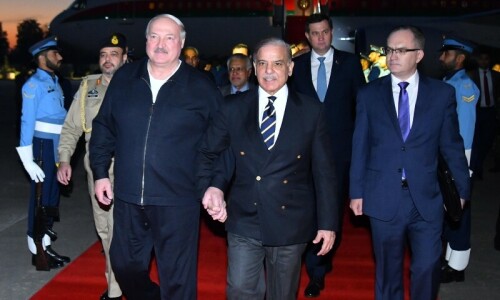WASHINGTON, Oct 13: Prime Minister’s Adviser on Finance Shaukat Tareen pledged on Monday that the government would bring all sectors, including agriculture, under the tax net to strengthen the national economy.
“There will be no sacred cows,” said Mr Tareen while addressing a news conference after attending the annual meetings of the World Bank and the IMF in Washington.
“Not even agriculture?” he was asked. “No sacred cows. Real estate, agriculture, all will be taxed.”
Mr Tareen categorically rejected speculative reports in the western media claiming that Pakistan is on the brink of bankruptcy. “Over my dead body,” said Mr Tareen when asked if Pakistan would go bankrupt.
Mr Tareen said the government had increased electricity tariff by 31 per cent, instead of the required 62 per cent.
“We decided to look back at further increase later and now that fuel prices are coming down, it will also reflect in energy policies. We may not have to further increase power rates.”
The adviser said that the government could raise remittances by overseas Pakistani by $1.5-2 billion a year through procedural changes.
This, he said, would be done by asking countries like Saudi Arabia and UAE to allow Pakistanis to send their money through the host governments instead of private banks, which are expensive.
Mr Tareen said that while the State Bank was looking at measures to help the stocks market, “We are not here to protect a particular player but to create liquidity”.
The stock brokers, he said, were complaining that they were not getting loans from banks against their shares and collaterals.
“Complaints like this will be looked into,” he added.
Mr Tareen also rejected rumours that the government had asked for information on bank lockers or was freezing assets. “Absolutely wrong. All nonsense,” he said.
The adviser had a series of meetings with the World Bank, IMF, Islamic Development Bank and the British Department for International Development.
He also met finance ministers of several countries attending the meetings and also with senior officials of other international financial institutions.
“We are facing economic challenges, both on the fiscal side and on the balance of payment,” he said. “We did not pass on the increase in fuel and food prices on time.”
Mr Tareen said the fiscal deficit stood at 7.4 per cent last year, but came down to 4.3 per cent due to the steps taken by the elected government.
The absence of inflows from multilateral agencies, lack of foreign direct investment, and the inability to access the international financial markets contributed to this crisis, he said.
The trade gap, he said, was over $20 billion last year and the current accounts deficits was a billion a month.
“It is quite a challenging job,” said Mr Tareen. “What the government has done is to pass on the increase in prices.”
The tax and GDP ratio, he said, was 10.5 per cent and extremely low. Mr Tareen said the government was trying to deal with this by cutting down expenditure and by encouraging private-public sector partnership.
“Money could be used for poverty elevation, education and health.”
Mr Tareen said help from the IFIs was forthcoming while the Friends of Pakistan group was meeting in Abu Dhabi next month to consider proposals for helping Pakistan.
The government, however, had also drawn back-up plans to ensure that even if this assistance did not come on time, the country had enough to meet its requirements and to move forward in an orderly manner.
As short-term measures, the government is trying to correct imbalances in macroeconomic indicators and is also working on eight or nine initiatives to move the country forward. These include safety net, income support fund, skilled-based training, health insurance and employment.
“We will focus on agriculture to eliminate food shortage and create employment opportunities,” said Mr Tareen.
The third area of concentration would be making trade and manufacturing more competitive, balancing exchange rate, through RTC, introducing bankruptcy laws and making the industry more competitive. The government is also working on human resources development.
Encouraging public-private partnership, integrated energy policy. For dealing with power and gas shortages, mineral resources, not explored or utilized yet such as coal, copper, will be developed.
Capital market reforms and administrative reforms will also be undertaken.













































Dear visitor, the comments section is undergoing an overhaul and will return soon.